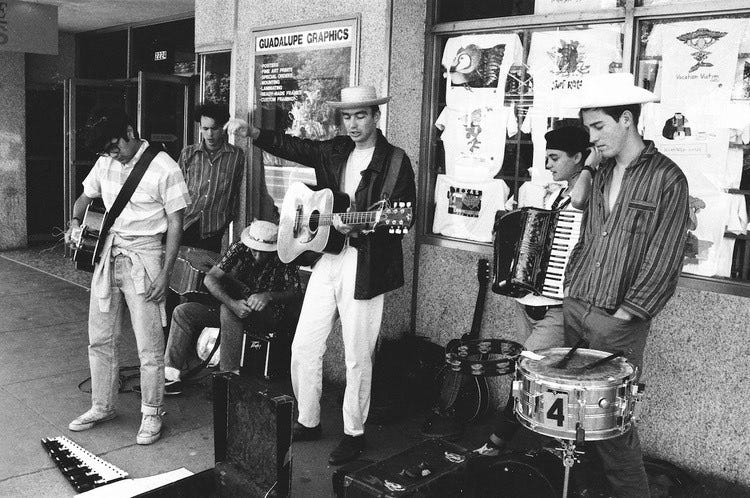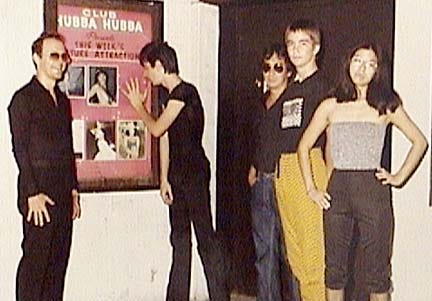Poi Dog Ponders 40 years of musicmaking
Austin-influenced Islanders are planning an anniversary tour
In January 1986, a wide-eyed street band from Oahu landed in L.A. where they bought a used GMC Suburban and set out to tour the Mainland, fueled by coffee, artistic license and the kindness of strangers. By the time Poi Dog Pondering hit Austin, near the end of ‘86, they were flat broke, and hadn’t eaten in two days. The road romance was wearing thin. But when Poi Dog set up to play on the sidewalk next door to the Co-op on the Drag, they were like no other buskers Austin had ever seen. (This was three years before Twang Twang Shock-a-Boom.) They identified more as beatniks than hippies, but they also had a very melodic sound. People danced. But after an hour that first day only one guy had tipped them, tossing a couple bills in the open guitar case. “I went over to get the money, and it was two twenty-dollar bills,” said Frank Orall.
After a good dinner, the ragtag crew showed up at the Continental Club’s “Hoot Night,” and organizer Mike Hall let them break format, performing their own material. “Robin’s in the metaphysical section,” Orrall started one pennywhistle ditty, and the charmed audience bopped along. This weary, unbathed band was fresh! The first song became seven, as nobody wanted them to stop.
“That's when we decided to stay in Austin a little while,” Orrall said of the magical first 24 hours in town.
What kept them here more than three years were the other musicians in town. Suddenly, Frank and Abra were surrounded by major musical talent, and because they had a record deal, with Texas Hotel in California, they could cherry-pick bassist Bruce Hughes, drummer Dick Ross (ex- Joe King Carrasco), violinist Susan Voelz, horn player/accordionist Dave “Max” Crawford and guitarist Adam Sultan. Later they were joined by fellow Hawaiian Ted Cho. Mike Stewart co-produced the first record with the band at Arlyn Studios.
“Richly melodic and boundlessly rhythmic, Poi Dog plays happy music in an era when optimism normally spells ignorance," I wrote of them at the time. “Their freshness and vibrancy cut through Austin like a blue stream across a parched countryside.” Rollo called them “professional naives.”
Poi Dog Pondering was the rage of SXSW 1988, the second one, when they levitated the crowd at Club Cairo. But they had a record coming out on Texas Hotel and weren’t thinking past that at the time. Nothing creates a major label feeding frenzy like turning them all down.
But Manhattan was a different story. Texas Hotel sent Poi Dog to NYC to open for labelmates Hetch Hetchy (with Michael Stipe’s sister on vocals) and they stole the show. That’s when things really got crazy with the bidding war.
This was an era when Edie Brickell and New Bohemians, Blind Melon and Blues Traveler were selling big and the neo-hippie movement was hot. Poi Dog didn’t have to pay for dinner once during their week in New York. The band that, just a year earlier had to pool their tip money for a jug of Paul Masson, was getting good at reading the wine list at fine restaurants.
They chose Columbia, signing for a six-figure recording budget, with enough left over for a new van (“Isabella”) and per diem. This time they’d tour the country in style.
I’ve known leader Frank Orrall since he was the 18-year-old drummer for Hawaii’s first punk band the Squids. They were the house band of a bi-sexual club called Wave Waikiki, meaning the crowd was hetero until about 1 a.m. when the band stopped, the disco started, and the gays came over from Hula’s and the Blowhole to dance until 4 a.m.
Squids leader Kit Ebersbach was always thinking of ways to be outrageously mundane a la Devo. One night at the Wave, Kit gave each member a white t-shirt he had emblazoned with their instrument. His said keyboards, Rudy’s said guitar and so on. That night Frank had a tough time beating away the guys, and then someone told him that “Drummer” was the name of a gay magazine.
I only thought of him as a really great drummer, so when he showed in Austin in the winter of ’86 playing an acoustic guitar and leading a street band, it was a big surprise. His sidekick was Abra Moore, originally from the Big Island, who moved to Oahu with younger sister Mia, a badass surfer who rode Banzai Pipeline waves as a 14-year-old.
Named after the Julie Harris character from East of Eden, Abra was from Puna, home of the world’s greatest marijuana. Puna Butter made Kona Gold taste like Folger’s, and her father was reportedly in agriculture. Frank’s father was a world class astronomer and college professor, while his mother was a folk music fan who taught herself how to play the guitar.
Burnt out on the Waikiki rock “scene,” Orrall started making cassettes with a four-track in his bedroom, overdubbing drums and other instruments, and selling them as “Poi Dog Pondering” from a box on the sidewalk in front of Woolworth’s. That’s where he and Abra and like-minded musicians would post-up most days, playing their wood guitars and marimbas and tinwhistles. Many of the most-loved Poi Dog songs, including “Living with the Dreaming Body,” “Pulling Touch” and “Everybody’s Trying” were first performed on that Waikiki sidewalk.
Freed from the kit, and the kaboodle of band membership, Frank was writing songs at a brisk clip and expanding his consciousness in the metaphysical section of Jelly’s record/book store, where his sister Chris worked. Frank has been nothing if not prolific.
Now he just had to get free from “the world’s most highly-technologized banana republic,” as Bill Mann, a former rock critic for the Toronto Star, wrote in ‘75. Island fever is real, especially if you’re into weird stuff.
Although Poi Dog (Hawaiian slang for a mutt) began as a solo project, Frank envisioned it as a band. He also foresaw a cross-country gypsy roadtrip. He’d climb a tree in his backyard and look out across the Pacific Ocean and see California. They left as five, and began their journey north to Vancouver and east to New York City.
“The circus of journalists mostly missed the point, thought we were neo-folk hippies 'cause we could sleep anywhere, had acoustic instruments and dared to be exuberant,” Orrall posted in a remembrance of those early years. “We weren't hippies - we were romantic to the bohemian… - and lusty for life.”
I was guilty of once referring to them as “the Wheatgerm Killers,” which Frank didn’t like at all. They were really more about caffeine, touring with an espresso machine they’d plug into gas station outlets (sending in sweet lost child Abra for permission).
The 1989 self-titled major label debut re-recorded some of the Texas Hotel e.p. and, with Columbia’s support, was a hit on college radio, when that meant something. Some scenesters pissed on these sea urchins as too wide-eyed and innocent, especially when they outdrew everybody but Stevie Ray Vaughan.
In the song "Postcard From a Dream," Frank imagines his muse Abra as a hummingbird lingering over a honeysuckle flower. But the flickering fowl was ready to settle down in Austin, where she started taking guitar lessons from Mitch Watkins (Leonard Cohen, Lyle Lovett), who eventually became her boyfriend. The great jazz guitarist also produced her 1995 debut LP Sing, on the Bohemia Beat label Mark Shumate created to release Jimmy LaFave records.
Shumate licensed Moore’s second album, 1997’s Strangest Places (also produced by Watkins), to the new Arista Austin imprint, which had branched off from Tejano to also sign Robert Earl Keen, Townes Van Zandt, Radney Foster and Sister 7. Abra got a Grammy nomination in ‘98, but was one-and-done with Arista when the Austin office closed in ‘99.
I didn’t ask what happened with Abra and Poi Dog when she dropped out after the first Columbia record. Frank and Abra had come to town as co-lead vocalists, but the first album was all Frank songs, except “Aloha Honolulu” by Bruce Hughes. I figured she wanted to do more of her own songs, so she went solo, but I didn’t know if any acrimony was involved.
The first big Poi Dog show after the second Columbia album Wishing Like the Mountain, Thinking Like the Sea was at Liberty Lunch. If I remember correctly, Abra was in the audience when Frank spotted her and called her to the stage. It sure seemed spontaneous, as the sound man quickly set up a second microphone, but Abra just sang all of “In the Shirt That You Wore” in the same mic as Frank.
“She’s my soul sister,” Frank told me recently. Even as Poi Dog has moved closer to dance music since relocating to Chicago in 1992, Abra has been on the last three PDP albums, and most of the tours this past decade. They continue to have great chemistry, these kids who couldn’t wait to play their new songs for each other.
“We had blood in our hearts that flowed with the road and a desire for adventure,” Frank wrote about the first year of Poi Dog. “When you are following what you love, the world breathes with you.”








Sorry, I didn't mean to publish this today. I was working on it, and thought I was just saving it. Oh, well, can't get it back. Look for PDP's 40th anniversary tour in Austin in late October.
Poi Dog Pondering is one of my favorite bands. Great performers, great songs.